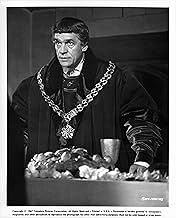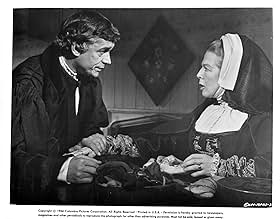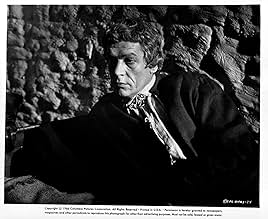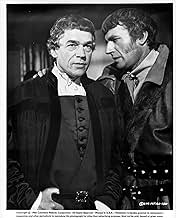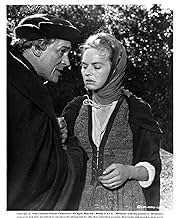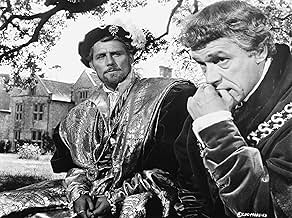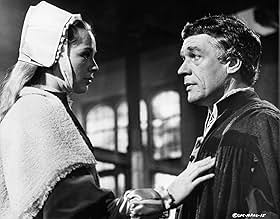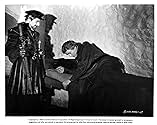A história de Sir Thomas More, que enfrentou o rei Henrique VIII quando o rei rejeitou a Igreja Católica Romana para obter um divórcio e se casar novamente.A história de Sir Thomas More, que enfrentou o rei Henrique VIII quando o rei rejeitou a Igreja Católica Romana para obter um divórcio e se casar novamente.A história de Sir Thomas More, que enfrentou o rei Henrique VIII quando o rei rejeitou a Igreja Católica Romana para obter um divórcio e se casar novamente.
- Ganhou 6 Oscars
- 34 vitórias e 9 indicações no total
Avaliações em destaque
What Robert Bolt and Fred Zinnemann had wrought is absolutely brought to glorious life by the incomparable characterization of Sir Thomas More by the chronically underrated Paul Scofield. Bringing superb support to the role are Nigel Davenport as More's close friend Norfolk, who is caught between the rock of his respect and concern for More and the hard place of his duty to (and fear of) Henry VIII; Leo McKern as the jovially sinister Thomas Cromwell, whose verbal jousts with More are virtual poetry from Bolt's pen; John Hurt as More's fair-weather friend Richard Rich; Dame Wendy Hiller as More's devoted but frustrated and misunderstanding wife; and the elegant Susannah York as his equally devoted and strong-minded daughter. Two stand-out performances in relatively small but vital roles: Orson Welles, magnetic as the shrewdly pragmatic Cardinal Wolsey; and Robert Shaw, whose energetic portrayal of a young Henry VIII (before his corpulent days!) dominates the screen the two times he's on it.
As with "The Lion in Winter," the remarkable scriptwriting is the driving force behind the story, but Scofield's dignified, restrained, but at the same time quietly forceful delivery are what give the writing its power. The great quotes of the film ("Why Richard, it profits a man nothing to give his soul for the entire world...but for Wales?" "When you are sent to heaven for doing your conscience, and I am sent to hell for not doing mine, will you come with me, for fellowship?" etc.) are conveyed with either enormous gravity or poignancy by nothing more than the tone of Scofield's voice.
I think that the dilemma at the heart of the tale and how men of power came to grips with it is artfully summed up in the dying words of Wolsey and, of course, More. Wolsey regrets he did not serve God as well as he served his king. More, on the other hand, dies as "His majesty's good servant...but God's first." Whether criticized or praised as a morality play, it's wonderful to at least HAVE an uncompromising morality play to watch from time to time -- especially one so well crafted.
The Tudor dynasty of England was an interesting 120 years or so. This film focuses on the very brief time that Henry VIII was fighting the Roman Catholic Church over him marrying a second wife after the same church had made a special dispensation for him to marry the first, with that first wife now past the age of childbearing and no surviving son resulting from the marriage.
Into the fray comes Sir Thomas More, a devout Catholic. This film distills More's viewpoints down to his refusal to recognize that Henry has any right to break off from Rome and declare himself supreme head of the church in England. More seemed willing to help with arguments made to Rome in favor of granting Henry a divorce from his first wife, Katharine of Aragon, but he would not go past that into the taking of church property as Woolsey suggested or into the complete break from Rome that Henry eventually made. More was willing to help Henry as far as "working within the system", but he believed that system - the Roman Catholic Church - was established by God and he would not support an alternative view.
More remained silent on the issue of what Henry was doing, thinking this would protect him. He even remains silent to the viewer, since he refuses to share his opinion with anyone, though one can surmise it from what he has said he will not do or swear to and the resignation of his office of chancellor.
The real irony is everybody wondering at More's caution proclaiming - "This isn't Spain, it's England!", with everyone being so sure of their civil liberties there. Yet Thomas Cromwell was executed by Henry in 1540 for pretty much facilitating his marriage to an unattractive woman (Anne of Cleves), Anne Boleyn was executed on trumped up charges of adultery because she too failed to produce a male heir and a second divorce would have just been embarrassing, and the Duke of Norfolk only escaped execution because Henry died the night before Norfolk's scheduled execution. So it turned out that in Tudor England, dying in bed could be a goal difficult to attain in spite of it not being Spain.
In the end, More was executed because of the lies of RIchard Rich, as depicted in the film. More had this guy's number from the beginning. Before his fall from grace, More had urged Rich to take a teaching job and not press his luck at court because of his weakness of character and thus his susceptibility to being bribed and tempted. And yet it was the morally weak and treacherous Rich who eventually ascended to the office of chancellor, lived past the age of 70, and died in bed of natural causes.
The strength of this film lies in its performances - Scofield's steadfastly loyal and honest Thomas More, Robert Shaw as the bombastic and big as life Henry VIII, Susannah York as More's well educated and wise daughter, and especially an almost unrecognizable John Hurt as the slimy little weasel Richard Rich. My apology to weasels everywhere.
It is intensely political and philosophical and really appeals to people who think about standing up for one's ideals even when it is very easy to allow ethics to be bent.
I can't add anything to what has already been said about A Man for All Seasons. Unquestionably one of the greatest films of all time, and stands the test of time. It will be revered as a great film 100 years from now. Will Lebowski? Doubt it. Winner of nearly every award it was nominated for. Best Picture, Best Director, Best Actor, Best Screenplay, etc. One of the few movies that makes my whole being vibrate when I watch it. I am moved to tears in almost every scene because the scene is executed so perfectly.
Please IMDb, this must give you pause. Any system that does not put this film in the top 100 borders on insanity or uselessness.
Oscars Best Picture Winners, Ranked
Oscars Best Picture Winners, Ranked
Você sabia?
- CuriosidadesProducer and director Fred Zinnemann, as quoted in his autobiography, calls this the easiest movie he ever made, thanks to the extraordinary caliber of the crew, and the actors and actresses, and the way they worked together.
- Erros de gravaçãoLord Chancellor Wolsey did not die in office; he was removed from the office of Lord Chancellor by Henry (because of his displeasure at Wolsey's failure to secure a divorce from Catherine), and died more than a year after Sir Thomas More became Lord Chancellor. Wolsey did, however, remain Archbishop of York.
- Citações
William Roper: So, now you give the Devil the benefit of law!
Sir Thomas More: Yes! What would you do? Cut a great road through the law to get after the Devil?
William Roper: Yes, I'd cut down every law in England to do that!
Sir Thomas More: Oh? And when the last law was down, and the Devil turned 'round on you, where would you hide, Roper, the laws all being flat? This country is planted thick with laws, from coast to coast, Man's laws, not God's! And if you cut them down, and you're just the man to do it, do you really think you could stand upright in the winds that would blow then? Yes, I'd give the Devil benefit of law, for my own safety's sake!
- ConexõesFeatured in Precious Images (1986)
Principais escolhas
Detalhes
- Data de lançamento
- País de origem
- Idiomas
- Também conhecido como
- El hombre de dos reinos
- Locações de filme
- Empresa de produção
- Consulte mais créditos da empresa na IMDbPro
Bilheteria
- Orçamento
- US$ 2.000.000 (estimativa)
- Faturamento bruto mundial
- US$ 756
- Tempo de duração2 horas
- Cor
- Proporção
- 1.66 : 1






